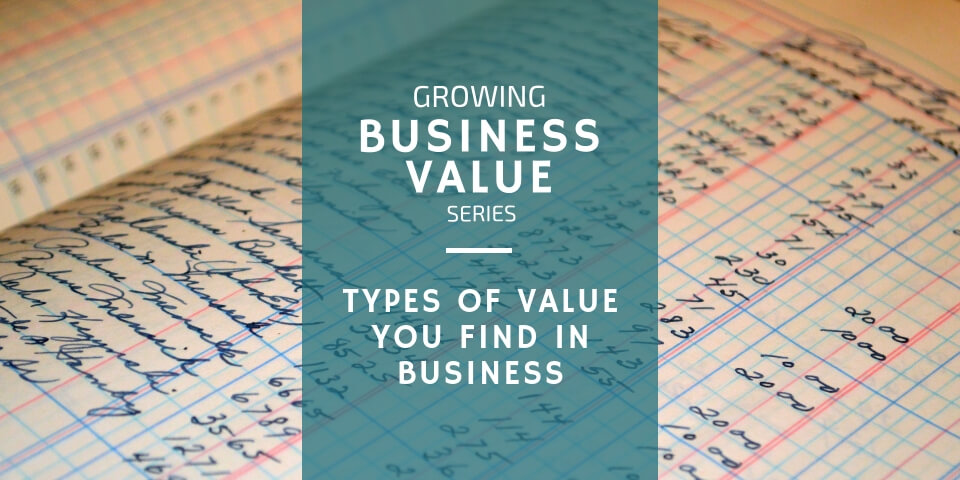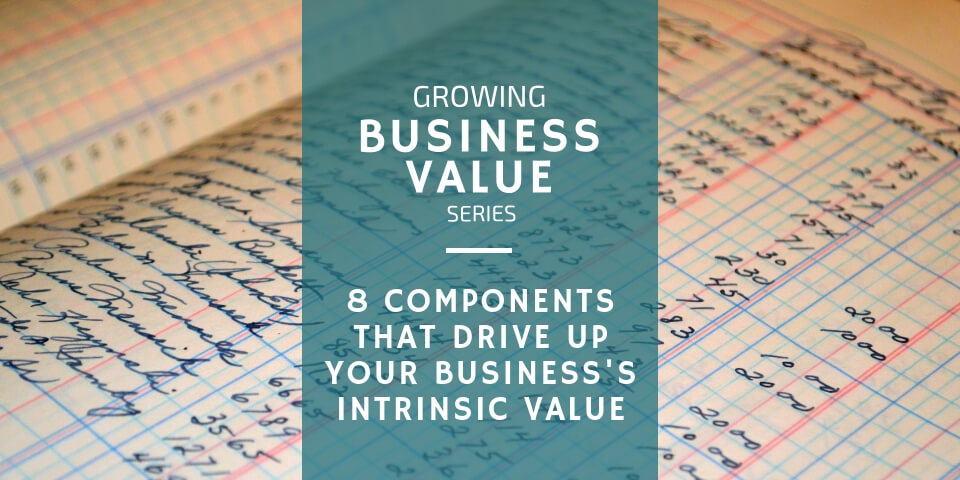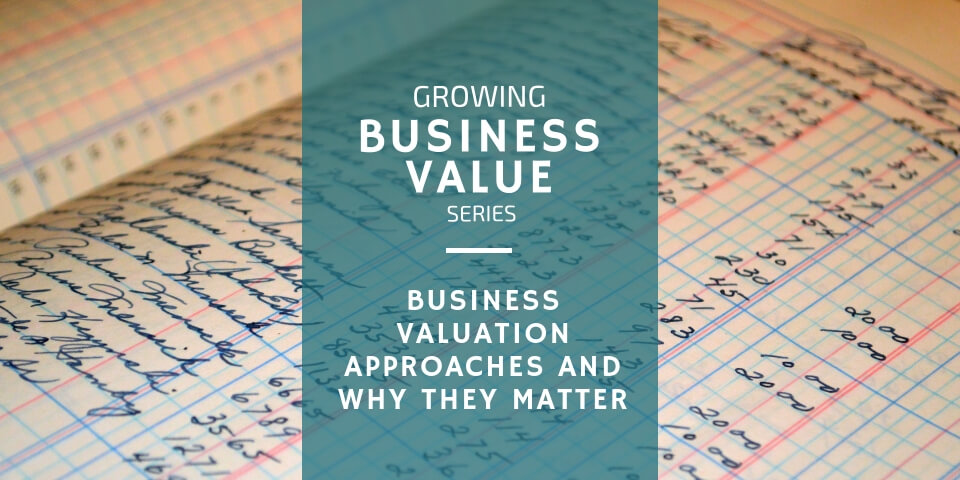
Types of Value in Business and the One That Matters Most
November 19, 2018
8 Foundational Components that Drive Up Your Business’s Intrinsic Value
November 26, 20183 Small Business Valuation Approaches and Why They Matter

It’s one thing for me to tell you that you should increase the intrinsic value of your business if you want to attract customers, investors, or buyers. It’s another for me to tell you how to increase that value. Before I can, you need to understand how business valuation works, from an appraiser’s perspective. So, we’ll discuss the three most common businesses valuation approaches appraisers use.
Podcast Time Index for “Basic Valuation Approaches and Why They Matter”
00:33 – The Principles of Valuation
01:13 – Is intrinsic value really the most important item?
01:54 – Transactional Value
03:11 – The Buyer’s Focus
03:57 – Value or Price?
05:51 – The Three Approaches to Valuation
06:34 – The Market Approach
08:43 – The Asset Approach
11:34 – The Income Approach
13:57 – Income is King
15:17 – Case in point
18:00 – Summary
Price or Value – Which is More Important to Buyers and Investors?
If business owners are seeking investors or buyers, they’re often concerned about the price others will pay them for their business or for an equity stake in their business. Although buyers and investors care about costs they will pay for a business, they’re more concerned about the value they’re getting for their investment.
Those looking at your business from the outside are asking lots of questions. For example, they might ask, “Is this business viable? Does it offer quality goods and services? Does the business have transferable patents, copyrights, or trademarks? Is the business centered around one good customer, or does it have multiple customers? Are customers loyal? What about the team members and managers? Are they older or younger? Will they be around a long time? Do you overpay them or underpay them? Do you have up-to-date operational systems in place, and do you utilize them appropriately?”
All those questions center around value. Therefore, which is more important to buyers and investors – the value of your business or the price of your business? Warren Buffet once said, “Price is what you pay. Value is what you get.” If you’re looking at your business from a buyer’s perspective, then you want to build a business so valuable buyers are willing to offer you a higher price than the “market” says your business is worth.
Three Business Valuation Approaches
Understanding the concept of value compared to price and value compared to profitability now brings us to the point in our Value Growth series where you need to know how appraisers determine the value of your business.
If you strip business valuations down to the most basic level possible, you’ll see that appraisers most often use one of three approaches to determine your business’s worth. Among the market approach, the asset approach, and the income approach, one is king. However, you need to understand each approach in order to understand how to grow value in your own company.
1. The Market Approach
First, appraisers can use a market approach to determine the value of your business. Yet, the key to this approach is whether your company is a publicly traded one or a privately held one.
The Guideline Public Company Method
If your company is large and publicly traded, then appraisers will look at the prices for which comparable companies’ shares have sold on the Dow, the S&P 500, or the Russell 2000 to determine the value of your shares. This is called the Guideline Public Company Method. Although this approach works really well for large, publicly traded companies, it’s hard to compare a company that size to a private mid-size company or to a small private company. Thus, most of you will not be affected by this method.
The Guideline M&A Transaction Method
Instead, appraisers will use the Guideline M&A Transaction Method to determine the value of your small or mid-size business. Here, evaluators look at the sales of companies similar to yours within your industry. They narrow down your industry based on your business’s classification within the North American Industry Classification System (the NAICS) or within the Standard Industrial Classification code (the SIC). Then, business appraisers will assess how similar the sold businesses (within your industry) are to yours. Are they in the same location? Do you serve similar customers? Is their revenue stream comparable to yours?
Unfortunately, most private companies’ information is, well…private. Therefore, appraisers will often have a difficult time comparing your company to other private companies because they won’t have access to the other companies’ revenue streams, profit margins, or demographics. The lack of public information makes determining your business’s worth extremely difficult in a Market Approach Method.
2. The Asset Approach
To avoid the difficulties they may face with a market approach, many business appraisers will use an asset approach to determine the value of a company. They’ll review your company’s financial records and run basic calculations to determine the value of your tangible or intangible assets.
The Adjusted Net Asset Value
First, appraisers could calculate your company’s adjusted net asset value. While this technique sounds intimidating, it’s fairly straightforward. Essentially, it’s the replacement value of your assets and liabilities in the event of a disaster or a sale. It could be the calculated value of your assets if you lose everything in a fire, or it could be the amount of money you’d get for your assets if you were to sell them.
To determine this “replacement” or “liquidation” value, appraisers look at your company’s balance sheet. They see how much your assets are worth on paper. Then, they subtract any liabilities you owe on the assets. Because this method uses your company’s book valuation of your assets, it’s often used as the baseline, or floor, method of your company. So if you’ve depreciated your assets on paper, be wary of having an appraiser use this method to determine your business’s value if you want to sell it for profit.
Excess Earnings Method
Another asset approach appraisers might use is called the excess earnings method. It’s more complicated than the adjusted net asset value method, but basically, it’s where an evaluator determines the value of intangibles. The appraiser will calculate the excess return on your company’s assets to get an intangible value. Since this particular calculation method assesses things like revenue from a blog or royalty income from published works, it’s very seldom used to determine a company’s worth in the event of a sale.
3. The Income Approach
So if appraisers typically don’t use the market approach or the asset approach to determine a company’s value, what do they use? Well, here’s where it gets important. Whenever it comes time for you to have your business appraised for sale or investment purposes, an evaluator will usually look at your income, or your cash flow, and compare it to the risks your business faces. In fact, the income approach is so valuable that Shannon P. Pratt, the chairman of Shannon Pratt Valuations, spoke about it in his book, Valuing a Business: The Analysis and Appraisal of Closely Held Companies. He said, “The income approach is king. Hands down. The income approach is key. Whatever approaches to value are used, they should be reconciled with the income approach.”
Capitalized Historical Cash Flow Method
Within the income approach, you’ll find the capitalized historical cash flow method. Just like it sounds, this appraisal approach looks at your historical cash flow. The appraiser takes the weighted average of that cash flow and divides it by a cap rate, or a capitalization rate, that reflects your business’s risk factors and its expected growth in the future.
The downside to using this cash flow method is that appraisers must use their own judgment to come up with that capitalization rate. They determine the types of specific risks companies have and how much those risk factors affect the companies. Therefore, the cap rate can vary from appraiser to appraiser which means your value can vary from appraiser to appraiser.
Discounted Future Cash Flow Method
Then, you have the discounted future cash flow method. Appraisers who use this method value projected future cash flows of your company then discounts the future cash flow with a discount rate which reflects the riskiness of the futuristic cash flow. Obviously, I’m trying to oversimplifying this process. But essentially, they’re discounting your business’s value by the riskiness of the future cash flow.
The tricky part of the discounted future cash flow method is that appraisers have to make a subjective decision about when your company’s cash flow will cease, reduce, grow, etc. Your business will not last forever. Therefore, appraisers must make an educated guess as to when your company’s cash flow will cease, or terminate.
Why Business Valuation Matters
Now, I’m not telling you that you need to learn how to value your company. However, you need to understand the various approaches to business valuation. Cash is king, or, in the world of valuation… the income approach is king. And within the income approach, appraisers either look backward to see what your company’s done, or they look forward to seeing what your company has the potential to do. Profits alone don’t determine your company’s historical growth, nor do they determine your future potential. No, your company’s qualitative factors increase or decrease its quantitative numbers that appraisers use to value your business. Your qualitative and quantitative factors together increase the value of your company.
If you understand the rules of the game, then you can “win.” Imagine trying to play football or baseball without knowing the rules. You’d never win. What makes you think you can grow the value of your company to the point you can sell it for profit if you don’t know the rules? Now that you have an idea of how appraisers value your company, it’s time to find out which qualitative factors drive up the quantitative factors of your business.
Join me in my next article as I discuss the 8 qualitative factors that drive up your business’s value to appraisers, buyers, and investors.



